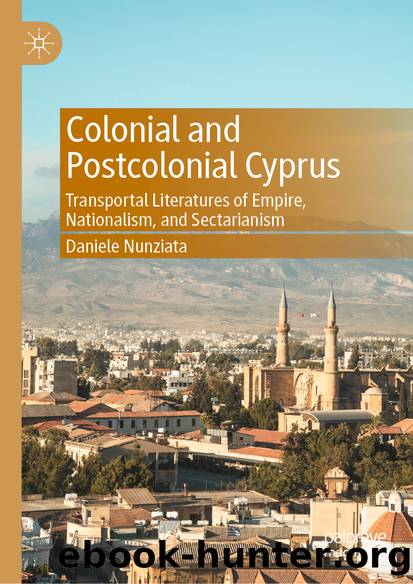Colonial and Postcolonial Cyprus by Daniele Nunziata

Author:Daniele Nunziata
Language: eng
Format: epub
ISBN: 9783030582364
Publisher: Springer International Publishing
Nationalism here is the discursive reiteration of colonialist binaries: the oppositions of Europe/âAsiaâ and lightness/âdarknessâ are re-appropriated to denigrate cultural differences. This Orientalist schism associates Turkish-speakers with an essential, timeless violence which threatens the stability of the island. However, the repetition of the instruments of conflict used by âTurksâ and âGreeksââthe âknives and axesâ of the former become the âpickaxes [and] knifeâ of the latterâimbricates parallels between the two groupings, like the shared figure of the nationalist âflag bearerâ, to deconstruct absolute difference. Indeed, counter to racialist concepts of physiognomic characteristics including those constructed by colonialist ethnologists, the physical, cultural, and social identities of âa Greek or a Turkâ cannot be visually differentiated by the narrator. Instead, he creates a subject position which sympathises with the mutual experiences of mourning across the island, regardless of linguistic âsidesâ.
Breaking from Hellenistic historical narratives, he stresses that the modern history of the island involves centuries of intercommunal cohesion, one which, having been ruptured, distorts the intrinsic identity of Nicosia itself. Framing these âchange[s]â as the product of a colonial âdivide and ruleâ policy, the account gestures metatextually to the changing structures of the increasingly-divided Nicosia of the 1960s (foreshadowing the climax of 1974), in opposition with pre-colonial unity described here and in Baybarsâ text. In addition to imperialism, however, the allusion to all three Guarantor PowersâBritain, Greece, and Turkeyâdistributes culpability among all three metropoles. Commencing with Greece, the monumentalised centres are re-written as sources, not only of culture, but sectarian politics. Nationalism and nationalist division are framed as a discursive âstoryâ reshaping history, society, and urban infrastructures for their agendasâa âstoryâ here repeated, but then revised, in the narratorâs writing-back to political interventions by both the British Empire and the equally-expansionist bodies of Greece and Turkey.
A preceding description of Nicosia presents it, like Baybars, as an essentially-pluralistic space âwith Greek, Turkish, and Frankish quartersâ within its Venetian walls. Stressing that â[w]ithin a few steps of one another were churches, mosques, covered Venetian balconies, the square of Serai where the Turkish Pashaâs palace had stoodâ¦â,151 the narrative imagines a transcultural city where religious buildings of different denominations exist peacefully and the last structure, the âPashaâs palaceâ, is recognised as an alternative to the Orthodox âArchbishopâs Palaceâ detailed in the Hellenocentric first chapter. While the narrator initially argues that outside âthe walls the new city of Nicosia began, free from the memory of conquerors, completely Greekâ, as part of a nationalist, anti-colonial restructuring of the space in response to Western European modernity, he revises this summary in the chapterâs conclusion to suggest that â[t]he new city did not break from the past⦠it had been built on the same foundation of historyâ.152 The closing refers ambivalently to how both British imperialism has failed to be fully repudiated and how Nicosiaâs layered, pluralistic âpastâ cannot be elided by purist nationalisms.
Indeed, in the final chapters of the work, almost all references to Greece and Hellenism are suspended. The final allusion appears during a depiction of the parades celebrating the advent of independence.
Download
This site does not store any files on its server. We only index and link to content provided by other sites. Please contact the content providers to delete copyright contents if any and email us, we'll remove relevant links or contents immediately.
The Power of Myth by Joseph Campbell & Bill Moyers(1047)
Half Moon Bay by Jonathan Kellerman & Jesse Kellerman(977)
Inseparable by Emma Donoghue(971)
A Social History of the Media by Peter Burke & Peter Burke(966)
The Nets of Modernism: Henry James, Virginia Woolf, James Joyce, and Sigmund Freud by Maud Ellmann(888)
The Spike by Mark Humphries;(805)
The Complete Correspondence 1928-1940 by Theodor W. Adorno & Walter Benjamin(773)
A Theory of Narrative Drawing by Simon Grennan(773)
Culture by Terry Eagleton(768)
Ideology by Eagleton Terry;(729)
World Philology by(711)
Farnsworth's Classical English Rhetoric by Ward Farnsworth(706)
Bodies from the Library 3 by Tony Medawar(700)
Game of Thrones and Philosophy by William Irwin(699)
High Albania by M. Edith Durham(697)
Adam Smith by Jonathan Conlin(684)
A Reader’s Companion to J. D. Salinger’s The Catcher in the Rye by Peter Beidler(674)
Comic Genius: Portraits of Funny People by(643)
Monkey King by Wu Cheng'en(641)
